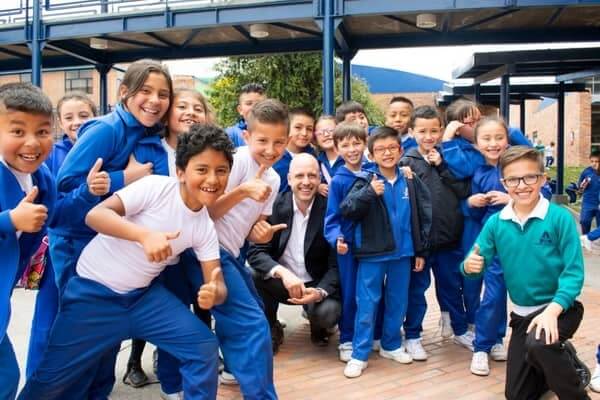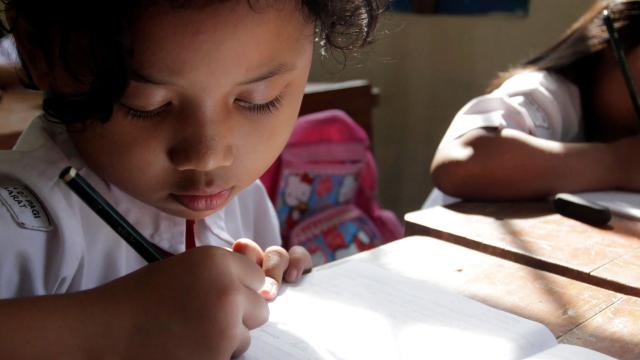My family is not rich but I had access to lots of opportunities while growing up because of the education I received. I want to help more and more Colombians have that same experience and get access to an excellent education. My background is in Government and not-for-profit, at different times and in different roles. I started working for the government, first at the national planning department, then at a poverty alleviation initiative, and then at the Office of the President as advisor for competitiveness policy.

Afterwards, I moved into the non-profit sector. In 2009, I co-founded a not-for-profit organisation called Volunteers Colombia (VC) and collaborated with several organizations in the United States to bring native speakers to teach English in underprivileged communities. We started with a pilot program of 5 volunteers, and 7 years later, we were running a program of more than 800 fellows in 10 cities and in partnership with the Ministry of Education. In 2010, I co-founded another organization, Teach For Colombia (TFC), member of the Teach for All network. At TFC, we recruit some of the most talented professionals and send them to teach in low-income and remote regions of the country. Some of our teachers even teach in conflict areas. We have countless testimonials from them about how education has reduced the number of children getting involved in the conflict. I have seen education as the most powerful tool to level the playing field and get children out of violence.
I got my Masters in Public Administration at Harvard in 2012 and returned to Colombia to become CEO of VC and TFC. 5 years later, I transitioned back to the government when I was appointed Deputy Minister of Education. It was one of the most challenging experiences of my life, but it was a very fascinating one. In the end, there is no way of transforming the education system but through public policies and politics. Our system is fractured, and ideology has taken over, so we need more than ever dialogue and understanding to build bridges among different factions. I once had to negotiate with the teachers union on a 37-day strike, and despite the tension, I managed to make the most of that experience.
I have now come back to the not-for-profit sector to work for Alianza Educativa, a network of charter schools (called concession schools in Colombia) founded by three of the top performing schools and the leading private university in Bogota. The opportunity to work with these organisations and to work hands on with low-income students has been amazing. As Deputy Minister of Education, my day-to-day role was far away from schools. Now, I spend at least one day a week in schools and get to see the life of a school, manage a network, train teachers and shape a school’s culture. That time in schools is the most special for me because I get to connect with children and teachers. I learnt this from Wendy Kopp – whenever you have doubts or are stressed about your work, visit the schools. Talk to people, visit a class, have a coffee with a teacher. Then everything will make sense. Hearing their stories and passion recharges me. This makes my work easier and gives me greater clarity on what I do.
I love speaking with our students. Last year, I went to one of our schools and met with the 10th and 11th graders one month before graduation. The 11th graders had just received their test results and had received the highest results ever for that school. They were celebrating their success and also telling the 10th graders “this is what you need to do next year because we have set the bar high for you guys”. I barely participated in the conversation; I only had to facilitate. The conversation between the 11th and 10th graders was inspiring; these 11th graders were setting high expectations and paving the way for the grade below them. One memory that stays with me is graduation last year – the culmination of many years of hard work from the staff and students. Watching so many students celebrate their scholarships and admittance to university and further programmes is a highlight of my time at Alianza.
Last year we won a public bid to run six more schools. We will grow from 5 to 11 schools and 11,000 students in just one year. We are undergoing a huge transformation and scaling up quickly. Our model is proven: we have the best performing schools in Bogota with decreased drop out and early pregnancy rates and increased access to higher education by 68%. However, we have a big challenge ahead of us in terms of going from “good” to “great”. From 60% access to higher education to 90-100%. With scaling up, we want to show new schools that we can do this in 5 years rather than 15 years. We cannot wait any longer for children to have access to an excellent education. I am more passionate than ever about education. I think I am lucky to have one of the most fascinating jobs in Colombia.
Our ultimate goal is that every student learns. Alianza has achieved incredible results. In Colombia, 3 out of the top 5 schools are Alianza schools. However, it is still not enough. 40% of our students do not go on to higher education. 30% of our 3rd graders do not attain minimum standards. We need to focus on the students who are struggling and not meeting goals and build out our curriculum for them. It is a challenge to translate this mindset across the organisation that currently celebrates the fact that most students are achieving. Our teachers currently think that 30 out of 40 students succeeding is great. We need to help teachers hold high expectations for all students and we must all keep improving until 100% of our students are learning at the expected level.
My focus right now is our 11,000 kids, but I still think to the future about system level change. I see a role for leveraging our knowledge and expertise to influence system wide change so others can use it. I would especially love to share our 21st century skills curriculum with more schools through the department of education. Colombia is one of the most unequal countries in the world but because of the opportunities I have had access to, I believe that all children in Colombia can have the same opportunities and chance for success. I love being Colombian and I believe our country can educate all of our children and I am working towards that every day.

